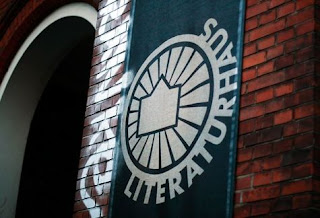Sad as it is, most of our previous articles focused on different obstacles and problems that people involved in independent bookselling have to face and cope with. This is understandable, as the conditions for opening a new indie bookstore are not very favorable these days and even some of the long-established names are having difficult times surviving.
 It is thus not often that we have an opportunity to write about a very successful project linking several aspects of literature within a broader cultural context. In the month of August, one of our visitors recommended the bookstore Litteraturhuset (House of Literature) in Oslo, Norway, and while doing the usual additional research about the bookstore, we were positively shocked to learn about the scope of activities of this institution. Reading about the principles behind the House of Literature project is like reading any other material published by an NGO with noble ideals – bittersweet sci-fi. None of its basic principles seem to fit into the free-market reality of the Western world.
It is thus not often that we have an opportunity to write about a very successful project linking several aspects of literature within a broader cultural context. In the month of August, one of our visitors recommended the bookstore Litteraturhuset (House of Literature) in Oslo, Norway, and while doing the usual additional research about the bookstore, we were positively shocked to learn about the scope of activities of this institution. Reading about the principles behind the House of Literature project is like reading any other material published by an NGO with noble ideals – bittersweet sci-fi. None of its basic principles seem to fit into the free-market reality of the Western world.The fact that this specific sci-fi became a true story in reality can serve as an inspiration for many others and it proves that, from time to time, the most improbable projects see the light of the day. But that’s not all. The concept is spreading and several new similar institutions have emerged in different countries. And that’s more than a mere lucky accident which doesn’t have much meaning in the long run. This means, that this idealistic project is well alive and working. And this is our attempt to explore why and how…
It all started in Berlin…
The concept originated in Germany, where the very first of these Houses was opened in Berlin back in 1986. It has slowly spread through several German cities and subsequently to some other countries as well. Although the name has slightly varied from one country to another (Litteraturhuset, International House of Literature), the original name of the first such institution in Berlin stuck well and the term Literaturhaus was adopted by most of its successors.
 Although in recent years the concept has spread to other countries as well, Germany remains the true hub of the Literaturhaus project. In the German speaking countries 11 of these Houses (8 from Germany, 2 from Austria and one from Switzerland) created an organization 'Literaturhaus.net', which coordinates common projects and even awards an annual literary prize. However, as we already mentioned, good ideas have a tendency to spread like a virus (unfortunately, this is equally true for the bad ones), and you can now visit a House of Literature in Oslo, Brussels, Copenhagen or Prague.
Although in recent years the concept has spread to other countries as well, Germany remains the true hub of the Literaturhaus project. In the German speaking countries 11 of these Houses (8 from Germany, 2 from Austria and one from Switzerland) created an organization 'Literaturhaus.net', which coordinates common projects and even awards an annual literary prize. However, as we already mentioned, good ideas have a tendency to spread like a virus (unfortunately, this is equally true for the bad ones), and you can now visit a House of Literature in Oslo, Brussels, Copenhagen or Prague.Literature above all
Literature in this setting has gained a new dimension. As almost all of its aspects are combined under one roof, the program directors of the Houses of Literature are trying to present its full potential. It is not understood as a relic which is unable to attract the public’s attention and is way behind other, more interactive art forms. The demand is obviously there and every Literatruhaus is doing its best to fulfill it. In the words of Rainer Moritz, the program director at the Literaturhaus Hamburg: "We've got the stuff for the reading addict and we're just the dealer of the legal drug and help people have their next trip."
The
 number of books sold is not the only criterion by which the success of this enterprise is judged. In fact, the bookstores which form a part of most of these institutions are more like a complementary to more general goals the Houses try to fulfill. Promoting literature, as vague as it may sound, is the unifying ambition, which is reflected in all the activities and the program section of each of the Houses. Although each of the Houses functions independently, as far as both the program and the financing are concerned, there are certain characteristics common to all of them. They offer an exclusive space for the self-realization of authors, translators, critics, theoreticians, booksellers, publishers, journalists and all literature enthusiasts.
number of books sold is not the only criterion by which the success of this enterprise is judged. In fact, the bookstores which form a part of most of these institutions are more like a complementary to more general goals the Houses try to fulfill. Promoting literature, as vague as it may sound, is the unifying ambition, which is reflected in all the activities and the program section of each of the Houses. Although each of the Houses functions independently, as far as both the program and the financing are concerned, there are certain characteristics common to all of them. They offer an exclusive space for the self-realization of authors, translators, critics, theoreticians, booksellers, publishers, journalists and all literature enthusiasts.One of the main and characteristic features is a space dedicated solely to writers who are invited to live and work right in the premises of the given Literaturhaus. Writers and translators, both local and foreign, are invited to become a part of the Literaturhaus community and to add to the creative atmosphere. All of the Houses are keen on promoting free speech and they definitely don’t avoid controversial topics – discussions covering not only literary but very often also political, cultural or any other current issues are held on regular basis with the participation of very interesting experts from the concerned fields.
 Other forms of art – music, film or fine arts, especially in forms connected to the literary world receive a lot of coverage as well. Most of the Houses also contain a multilingual bookstore and even their own library while some of them organize annual literary festivals. The activities really defy any borders between different forms of art; the House of Literature in Oslo even produced a theater performance involving a renowned Norwegian cast.
Other forms of art – music, film or fine arts, especially in forms connected to the literary world receive a lot of coverage as well. Most of the Houses also contain a multilingual bookstore and even their own library while some of them organize annual literary festivals. The activities really defy any borders between different forms of art; the House of Literature in Oslo even produced a theater performance involving a renowned Norwegian cast.And the bill goes to…
The question that inevitably arises concerns the way these institutions are able to cover the costs associated with their functioning. And indeed, keeping a balanced budget is one of the main challenges of each Literaturhaus, as their scope of activities is quite far from modest. It is very important to realize that these institutions are far away from a local independent bookstore where the owner makes most, if not all, of the decisions regarding its future. Houses of Literature are big conglomerates in every sense of this word and their successful functioning requires a very high level of cooperation between different sections and all the organizations involved. Good management is as important as a strong belief in the principles and ideals of the Literaturhaus project.
This is also evident if you look at the organizational model of the Houses. Literaturhuset in Oslo operates as an independent foundation run by a seven-member board of trustees. However, the power of the Houses of Literature lies in their ability cooperate with a wide variety of organizations and thus multiply their potential to offer quality events in different fields.
The strategy adopted by the Houses relies on diversifying the financial resources instead of relying on a single income source. One of the ways to cover the expenses is renting out their premises for cultural events organized by different institutions or groups. This opportunity is open to commercial companies as not all the events are open to public. Some of the activities are also financially supported by the governments of the given country. Another important source of income is represented by donations from individuals, interest groups or foundations.
Travel without moving
Of course, it would be very naïve to think that it is possible to establish a Literaturhaus in any city. The experience of the existing ones shows that it requires a whole set of favorable conditions to be present in one place at the right time. And even then, the commitment to delivering a quality program on a regular basis means an almost constant struggle for finances.
No,
 this concept of the Literaturhaus is not universally applicable and that’s not even its main ambition or ‘strong point’-positive. We think that the true value of this project lies within the general message that it is dedicated to spreading. Recreating and supporting the notion of literature with a deeper meaning and impact, literature as an end in itself, not just a means to generate profit. It should help create an alternative to the dominant commercial and purely profit-oriented mainstream, where a new book only has a few weeks on the shelves to become an instant bestseller, otherwise it is labeled as a failure and falls into oblivion.
this concept of the Literaturhaus is not universally applicable and that’s not even its main ambition or ‘strong point’-positive. We think that the true value of this project lies within the general message that it is dedicated to spreading. Recreating and supporting the notion of literature with a deeper meaning and impact, literature as an end in itself, not just a means to generate profit. It should help create an alternative to the dominant commercial and purely profit-oriented mainstream, where a new book only has a few weeks on the shelves to become an instant bestseller, otherwise it is labeled as a failure and falls into oblivion.Literaturhaus is a space where literature has found not only its shelter but also home. The fact that special places like these exist and are actually growing in number is definitely something to build on.
_ _
References:
Bowen, K. (2010): Jury announces long list for German Book Prize
Soltau, H. (2010): Germany's 'literature houses' stress reading books over selling them
http://www.litteraturhuset.no/english
http://www.literaturhaus.dk/65/
http://www.literaturhaus.net
---
Images used:
1: http://www.spottedbylocals.com/copenhagen/literaturhaus/
2: http://www.literaturhaus.net/netzwerk/index.htm
3: http://annalogie.de/index.php?sid=6
4: http://www.passaporta.be/index.php?q=passaporta/literaryfestival/
5: http://adsoftheworld.com/media/print/literaturhaus_passport
_ _
More articles from this series:
The Indie Bookstore: How to Expand Your Influence and Become an Integral Part of Your Community
An Interview with an Antiquarian Bookseller: The Caretaker
Independent Booksellers: What Can Be Done to Help?
Chain Bookstores: The Rise, Struggle and Downfall?
Independent Booksellers and the Fixed Book Price: a Horror Story?
Independent Bookstores in Danger of Extinction – Who is to Blame?
An Insight into the Current State of Independent Bookselling – An Introduction
_ _
Back to the full list of Articles



No comments:
Post a Comment